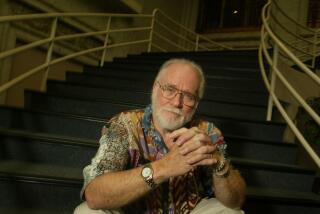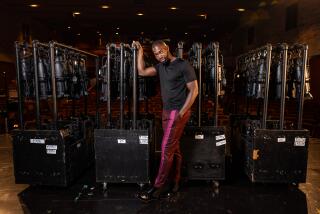Theodore Bikel and Tevye, the perfect match
Sweeping statements are risky, but one can be made confidently about Theodore Bikel: No living actor’s connection to a fictional character has been more lasting or deeply personal than his lifelong walk with Tevye the Dairyman.
Bikel is 89. Three years ago, he bade an unceremonious and unsentimental farewell to the mainly lighthearted Tevye who drives “Fiddler on the Roof” — a part he played more than 2,100 times over 42 years. But leaving behind the musical was not the same as saying adieu to Tevye.
“Tevye light” is how Bikel summarizes the leading figure of “Fiddler.” He now is occupied with full-strength Tevye, the tragicomical character developed in the series of increasingly darkening stories that Sholem Aleichem wrote in Yiddish from 1894 to 1914 — years in which life grew increasingly precarious for Jews in Russian villages like the author’s fictional Anatevka.
PHOTOS: Best in theater for 2012
Bikel, who became a full-time Los Angeles resident five years ago, continues to perform a one-man show he wrote himself, “Sholem Aleichem: Laughter Through Tears.” He portrays Tevye and sings, but nothing from “Fiddler.”
Also in the works is a documentary feature he’s producing and starring in, “Theodore Bikel in the Shoes of Sholem Aleichem.” He hopes it will arrive on the film festival circuit next year. Maybe it could be screened at next summer’s Jewish Culture Festival in Krakow, Poland, where a belated 90th birthday celebration is planned for Bikel, who shares a May 2 birthday with the man he’s named for, Zionism’s founder, Theodore Herzl.
The immediate item on Bikel’s agenda as he sat in a bright and airy apartment in Westwood, where the decor includes a wall of books, Marc Chagall posters and an old but pristine-looking Spanish guitar perched on a stand next to a baby grand piano, is a new live-performance twist on Tevye.
PHOTOS: LA Opera through the years
The Los Angeles Jewish Symphony’s concert Sunday at Ford Amphitheatre includes the U.S. premiere of “Symphonic Suite Reb Tevye,” a 1990s work by Russian composer Eduard Fertelmeister. Bikel will perform spoken monologues as Tevye between the orchestral sections.
Noreen Green, the Jewish Symphony’s artistic director and conductor, says the music darkens as the piece progresses — as do Aleichem’s stories, where Tevye’s humor never relents, but his sorrows multiply far beyond anything seen in “Fiddler.”
“Who else would I ask but Theodore Bikel?” Green said.
It’s a reunion for Bikel and the Jewish Symphony, who were teamed in 1998 at the Greek Theatre for a 50th-anniversary celebration of Israel’s independence (an event that in 1948 brought on one of the toughest decisions of Bikel’s life).
PHOTOS: Arts and culture in pictures by The Times
“You have to realize that the dark side depicted by Sholem Aleichem is just as important, if not more” than the comedy and resilience that have made Tevye popular through “Fiddler,” Bikel said. “He has wonderful sides. On a dime, he can turn from a hilarious description of the shtetl and its people, to squalor, suffering, hunger and tragedy. The two together are why I call my show ‘Laughter Through Tears.’”
Bikel’s own troubles include the death last year of his third wife, musician Tamara Brooks, who was 70. He says the same tradition that Tevye celebrates in the famous opening number of “Fiddler” teaches that there must be an end to mourning and the living must embrace life again. And so he does.
His connection with Tevye began when Bikel was a small boy in a second-floor apartment in Vienna, overlooking one of the main drags, Mariahilfer Strasse. The family had a complete Sholem Aleichem collection, more than 20 volumes, and his father, Joseph, who sold insurance, would read aloud.
PHOTOS: Hollywood stars on stage
In March 1938, when Bikel was 13, a grand parade of cannons, tanks and soldiers rolled down Mariahilfer Strasse, cheered by throngs of Viennese who welcomed the Nazi German forces who were overthrowing Austrian independence without a shot being fired. Peeking from behind drawn curtains, Bikel watched Adolf Hitler ride into view, standing in an open limousine.
Sitting 75 years later in his living room, sporting his trademark snowdrift of hair swept over his forehead, Bikel crooks his right arm at the elbow, hand to his breast, then flings it upward and outward, in the salute he saw Hitler give that day. In Sholem Aleichem’s story, a minor constable of the Czar informs Tevye that the Jews no longer are welcome in Anatevka and must leave immediately. Young Theodore Bikel received the message from the Fuehrer.
Within a few months, the family had escaped to Palestine, thanks to his father’s connections as a committed Zionist. Bikel spent most of his teen years on a kibbutz, then joined the Jewish community’s leading theater, Habimah. His first paid role, 70 years ago, was the Czarist constable in a Hebrew production of the Tevye stories.
CRITICS’ PICKS: What to watch, where to go, what to eat
In 1948, Bikel, by then a recent graduate of the Royal Academy of Dramatic Art in London, decided not to return for Israel’s War of Independence, where he’d likely have been expected to perform to lift soldiers’ morale.
“A few of my contemporaries regarded [it] as a character flaw, if not a downright act of desertion,” he wrote in his 1994 autobiography, “Theo,” adding that his decision to remain in London so he could pursue acting at the highest level may have left him with “a half-conscious desire to atone.”
He has been a sometimes-fierce advocate for Israel, but since 1980 Bikel consistently has protested its settlements on occupied lands. Recently he has spoken out against government proposals to uproot Bedouins from their traditional encampments in the Negev desert and resettle them in towns. The parallel to the Jews of Anatevka, he says, is all too obvious.
ART: Can you guess the high price?
In the late 1970s, Bikel fired verbal cannonades at Vanessa Redgrave for funding and narrating “The Palestinian,” a documentary advocating the armed overthrow of Israel and Zionism, which she labeled “a brutal, racist ideology.”
Bikel may owe his career to her father, Michael Redgrave. Having seen the young actor perform, Redgrave suggested him to director Laurence Olivier as a promising candidate for the cast of the 1949 British premiere of “A Streetcar Named Desire.” Bikel had a bit part as one of Stanley Kowalski’s poker buddies, but he saw considerable action as the understudy for Blanche DuBois’ would-be boyfriend, Mitch. On a few occasions, he went on as Stanley as well, opposite Olivier’s wife, Vivien Leigh.
Bikel came to America at the end of 1954 for a Broadway role, quickly made a mark as a folk singer with albums of Jewish, Israeli, Russian and Gypsy songs, and by 1959 was an Oscar nominee as the sheriff chasing chained-together escaped convicts Sidney Poitier and Tony Curtis in “The Defiant Ones.”
CHEAT SHEET: Spring Arts Preview
But the window closed on any chance of stepping up to starring screen roles because, at that crucial moment, he decided instead to originate the part of Baron von Trapp in “The Sound of Music” on Broadway. He played opposite Mary Martin’s Maria for two years. Sensing that something was missing during out-of-town previews, Richard Rodgers and Oscar Hammerstein II wrote “Edelweiss” for Bikel to sing and strum on his guitar. It was the swan song for Hammerstein, who died in 1960.
In 1967, Bikel’s friend, Harry Belafonte, was playing Caesar’s Palace in Las Vegas and suggested to management that Bikel would make a splendid Tevye for the somewhat truncated production of “Fiddler on the Roof” that they planned to present twice daily for a six-month run starting in 1968. Thus began his association with the role that would take him everywhere but Broadway, where Zero Mostel originated Tevye in 1964. Bikel says he was too steeped in Sholem Aleichem to go for audience-pleasing antics like Mostel.
His choice of spareness and simplicity was vindicated years later, he said, when the show’s lyricist, Sheldon Harnick, wrote to him after seeing him star as Tevye in Hartford.
“He said, ‘I was sitting there during the first scenes and thought to myself, “What is Theo doing? What is this bare-bones performance he is giving?” By the second act, I saw you were stripping the role of shtick and playing the essence so real, so genuinely, that I who had seen the show hundreds of times started to cry.’”
“If I learned anything, it’s that less is more, don’t overdo things,” Bikel said. “It’s richer if you’re spare.”
More to Read
The biggest entertainment stories
Get our big stories about Hollywood, film, television, music, arts, culture and more right in your inbox as soon as they publish.
You may occasionally receive promotional content from the Los Angeles Times.







